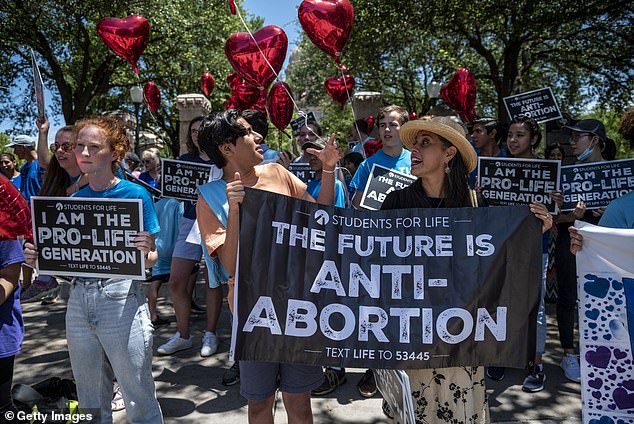The Texas Republican Party has introduced a proposal that appears to call for the death penalty for women seeking abortions, as well as the doctors who help them.
At a Republican Party convention on Saturday, Texas delegates presented a detailed platform defining abortion as “not health care…murder.”
The 50-page document calls for “equal protection of the laws for all unborn children from the moment of fertilization,” and that doctors only be exempt from murder charges when the abortion “is not elective, such as that required to save the mother’s life.’
Under Texas law, perpetrators of child homicide are punishable by death.
Pro-life protesters stand near the gate of the Texas State Capitol at a protest in front of the Texas State Capitol on May 29, 2021 in Austin, Texas.
Representatives are currently voting on whether or not to approve all the proposals.
Commenting on the platformsaid Farah Diaz-Tello, senior attorney and legal director of Lawyering for Reproductive Justice. angry post that the death penalty is the “next logical step” in the anti-abortion movement in Texas.
However, speaking to DailyMail.com, legal experts in Texas have suggested that the party’s platform has “no relationship to the legislature” and, in practice, enforcing the death penalty for abortions in Texas would be “virtually impossible.”
“Texas Republicans are simply reaffirming beliefs that we know they have long held,” the lawyer told DailyMail.com.
‘For women to be sentenced to capital punishment, there would have to be a law that clearly states this, and party platforms have no influence on this.
‘Furthermore, district attorneys rarely, if ever, prosecute women who have abortions. “They are more likely to go after the doctor, and even then it is an uphill battle.”
According to the Death Penalty Information Center, more prisoners have been executed in Texas than any other state since 1976, with 586 capital deaths.
Currently, abortion is punishable by up to 99 years in prison in Texas, both for the woman who undergoes the procedure and for the medical professional who assists her.
However, in practice, the person seeking an abortion is rarely brought to trial.
The legislation has been in effect since August 2022, two months after Roe v. Wade, which prohibited states from banning abortion, was overturned.
The number of abortions in 2022 fell by 59 percent compared to the previous year, from around 53,000 to 22,000, according to figures from the Lozier Institute.
And more recent figures suggest this rate has plummeted sharply since then, with just 17 legal abortions recorded in the first four months of 2023, according to the Texas Health and Human Services Commission.
However, this is believed to be a significant underestimate.

At a press event in April, former President Donald Trump said he believed a national abortion ban was no longer necessary.
The new proposal also calls for “preserving” the dignity of human embryos, including a “ban on trafficking in human embryos,” referring to people who want to undergo IVF out of state.
This has raised fears that Texas could soon follow in the footsteps of Alabama, where human embryos are granted the same legal status as children.
The decision led to the closure of the state’s main IVF clinics, fearing criminal prosecution if embryos were inadvertently damaged.
Also in the proposal is a reference to homosexuality as an “abnormal lifestyle choice” and a denunciation of “all efforts to validate transgender identity.”
“We believe that gender bending and any form of gender-affirming child care does not constitute health care and is, in fact, child abuse,” the proposal says.
Currently, abortion is illegal in 14 states and another seven restrict access to the procedure.


